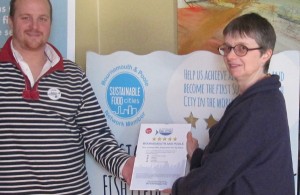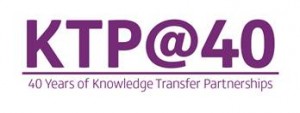Here in South Africa kicking off the Fusion Fund project on controlling pest infestations in abalone aquaculture. I arrived safely in Stellenbosch yesterday after the overnight flight from Heathrow. It was nearly two hours late but actually arriving at 08.30 rather than 06.30 local time is not a bad thing. I met up with Carol (Dr Carol Simon) in the Botany and Zoology Department of Stellenbosch University today. Two BU students will be here on the Fusion Fund project early this summer so sorting out the details for their visit are the first priority. We need to plan all the experimental work carefully to make sure we don’t lose time and get everything done (I should say achieve all the objectives!) that we need to during their research visit.
/ Full archive
Lunchtime Seminar with Zoe Sheppard on 4th March
Lunchtime Seminar on the Findings from Research Impact Scoping Exercise, Wednesday 4th March in R302
Research should make a difference, and as the Faculty’s strapline is ‘helping to make people’s lives better’, it is of relevance to us all. Our forthcoming Seminar series will showcase some of the excellent work of the Faculty to inspire other academics and PhD students.
No need to book, just turn up. Contact Zoe on zsheppard@bournemouth.ac.uk for more information.
Future Impact Seminar dates can be found by clicking on the link below.
We look forward to seeing you there.
Bournemouth & Poole Sustainable Food City Partnership achieve Sustainable Fish City Award – a great outcome from partnership working.
 I have reported previously on BU’s engagement as a partner in the Bournemouth & Poole Sustainable Food City Partnership (SFC) http://blogs.bournemouth.ac.uk/research/2014/05/21/getting-on-board-with-the-bournemouth-and-poole-sustainable-food-cities-partnership/
I have reported previously on BU’s engagement as a partner in the Bournemouth & Poole Sustainable Food City Partnership (SFC) http://blogs.bournemouth.ac.uk/research/2014/05/21/getting-on-board-with-the-bournemouth-and-poole-sustainable-food-cities-partnership/
It is now exciting to provide a further update – as part of the project Bournemouth and Poole have become the first towns in the world to achieve Sustainable Fish City status. Some of the most important caterers and restaurant locally have committed to serving only verifiably sustainable fish, impacting upon over 3.6 million fish meals a year throughout the towns.
The campaign, run by the partnership, has been asking businesses and organisations across the two towns to make a pledge and commit to only using sustainably sourced fish in their menus. Institutions involved include nearly all primary schools, leisure centres, theatres, Bournemouth Pavilion, large workplace restaurants, Bournemouth University, all major hospitals and some of the most iconic and best-loved restaurants including the Highcliff Marriot Hotel and A.F.C. Bournemouth. Despite hot competition from a number of other cities across the UK we are the first to receive the prestigious five star Sustainable Fish City award.
It is a truly extraordinary achievement which will have a huge impact on the local and national supply chain for fish.
Already we are seeing the impact of the campaign beyond Bournemouth and Poole – Harrison Catering Services, one of the UK’s top education and workplace caterers have recently taken the Fish Cities pledge on behalf of their UK-wide operation, and a major inspiration was the pledge of their Poole-based customer, the Jordans and Ryvita Company.
Molly Scott Cato, South West Green MEP, presented the award to Matt Budden, the Executive Chef of the Highcliff Grill at the Marriott Hotel on behalf of Sustainable Fish Cities at her recent visit to the area.
Ruth Westcott, Co-ordinator of Sustainable Fish Cities said:
“We are absolutely delighted to crown the world’s first Sustainable Fish City in Bournemouth and Poole – this campaign began back in 2011, inspired by the sustainable fish on the menu at the London 2012 Olympics, and it has taken a lot of hard work to get here.
Many of the world’s fish stocks are in a worryingly depleted state, but there are still shockingly few places in the UK that you can eat out safe in the knowledge that you are not eating an endangered or unsustainably caught species. Bournemouth and Poole’s most important and iconic institutions have proven that it is possible for any kind of caterer or restaurant to take action on this issue. I am sure they will be an inspiration to many other towns and cities in the UK to follow suit.”
Sarah Watson, Manager of the Sustainable Food City Partnership for Bournemouth and Poole said:
“We were determined that Bournemouth and Poole would be the first area to achieve this award. We not only have some of the best places to eat out in the country but we also have an important fishing industry around Poole Quay which is a significant part of our local culture.”
£4M Protecting Data in Industry

Innovate UK is to invest up to £4 million in collaborative research and development (R&D) projects that tackle the growing risks of disruption to internet-enabled businesses and their digital supply chains.
With the Internet of Things providing new sources of data and end-users’ ever-increasing digital footprint, it is difficult to adequately protect the interests of a business, industry or sector. There is also a lack of understanding of the effects disruption may have. Desired proposals would address the challenge of protecting a business, industry or sector from digital disruption that could compromise data across the digital supply chain.
A series of briefing events are being run during March and April:
Belfast: 25 March 2015 – https://www.eventbrite.co.uk/e/protecting-data-in-industry-briefing-belfast-registration-15751274486
Cardiff: 30 March 2015 – https://www.eventbrite.co.uk/e/protecting-data-in-industry-briefing-cardiff-registration-15751564353
London: 31 March 2015 – https://www.etouches.com/118529
Edinburgh: 01 April 2015 – https://www.eventbrite.co.uk/e/protecting-data-in-industry-briefing-edinburgh-registration-15751602467
Talk BU Live this Tuesday in Dylan’s
Paola Palma will be talking about “Shipworms, shipwrecks and global ‘worming'” on Tuesday 24 February in Dylan’s bar at 5:30pm.
Join us for a fascinating insight into maritime archaeology and find out how we can save historical shipwrecks from being eaten by shipworms.
The talk lasts just 20 minutes and is followed by a short Q&A. To find out more or get to involved check out the Talk BU pages.
Please note this talk will be filmed and made available online.
Congratulations to PhD student Sarah Price for her award
Congratulations!
Well done to PhD student Sarah Price who has been awarded a grant from Sawtooth (worth approximately 5,000 US dollars) to use their software MaxDiff and CiW in conjoint analysis. They will highlight her research and BU on their web page which is great for impact and for dissemination of her work.
Sarah is collecting data in the UK and Germany where her research looks at eating out and aims to evaluate the type of information that consumers value when selecting food particularly in a work site canteen. Past food scares have created a great interest in information about food and so this is a hot topic of interest.
The grant will allow her to now progress with the primary data collection and analysis.
Europe needs Post-Docs!
You can apply to the Call for Expressions of Interest if you are from the EU Member States and from Associated Countries: Albania, Bosnia & Herzegovina, Faeroe Islands, Iceland, Israel, Liechtenstein, Montenegro, Norway, Republic of Moldova, Switzerland, the Former Yugoslav Republic of Macedonia, Serbia and Turkey.
You will also need to meet the following educational requirements:
A level of education corresponding to completed university studies of at least three (3) years attested by a diploma and
- at least five (5) years of professional experience in one of the fields listed below:
– OR – - a doctoral diploma in one of the fields listed below (see sections II and VI of the call):
Biology, Chemistry, Natural Sciences, Life Sciences, Biochemistry, Oceanography / Marine Sciences, Nanotechnology, Nanobiotechnology, Veterinary, Engineering, Mathematics, Physics, Computer Sciences, Statistics, Material Sciences, Economics, Political Sciences, Social Sciences, Educational Sciences, Psychology , Geography, Environmental Sciences, Agricultural Sciences, Agricultural Engineering, Meteorology, Ecology, Forestry, Geology, Hydrological Sciences, Medical Sciences, Pharmacy, Nutritional Sciences
If this does not apply to you but you have a colleague who would benefit from this opportunity, please pass this information on to them.
GeoNet climate change event and next seminars
GeoNet, the fusion-funded interdisciplinary seminar project, held our first lunchtime session ‘A conversation about climate change’ recently. We were really pleased to see the Coyne so packed out (come early next time to be sure of getting a cookie!) with a wide range of students, PGRs and staff from across the university. Short talks to introduce the panel members (covering both the impacts of climate change and how these are communicated) were followed by a very interesting discussion. We considered how terms are often used out of context or incorrectly (for example the ‘Anthropocene’ in the geological sense of the word would be classified after the fact). It was also interesting for me personally to discover why there is often false balance in the media when climate change is discussed – the reporters have to use a political template (because climate change is a politicised subject) and this template calls for equal representation of the views of all sides. Of course this results in a poor representation of the state of scientific knowledge.
We also discussed the right of non-scientists to enter the debate – this is based on a democratic right to have an opinion but not necessarily on knowledge. The cult of celebrity was an interesting topic, not something that I expected to be discussing in the context of climate change, but perhaps we need more celebrities to support David Attenborough in representing environmental change. Leading on from this, we discussed whether scientists should have more media coverage. Whilst this might seem an obvious way of increasing public knowledge, it could backfire because scientists have a general lack of media training, lack of experience in delivering ‘soundbites’ and have to acknowledge uncertainty, which can negatively affect the public perception of them as experts. We decided that social media might be the answer, as it is not bound by the politicised template and can provide a platform for scientists to talk about their findings, as well as allowing discussions to enable understanding of what uncertainty actually means.
Our next two events are The Hero’s Journey of Alfred Russel Wallace in Southeast Asia from 18.00-19.30 on the 10th March in Barnes Lecture Theatre and Low carbon cities: why and how from 12.00-13.00 on the 17th March in TAG02. Tea, coffee and cookies will be provided at both and active participation is encouraged!
Booking is necessary for the 10th March via http://www.eventbrite.co.uk/e/the-heros-journey-of-alfred-russel-wallace-in-southeast-asia-tickets-13409922439 (free to BU staff and students)
14:Live Today!
Today will see 14:Live returning for its second run from 14:00-14:45 at the same location, Poole House Refectory, next to Papa Johns. It is open to all staff and students and 14:Live is pleased to welcome Dr Samuel Nyman, senior lecturer in Psychology.
Enhancing care services for people with dementia
The Bournemouth University Dementia Institute (BUDI) was established in May 2012 with a mission to make a positive influence on the lives of people with dementia. BUDI is made up of a multidisciplinary team that provides education, consultancy and evaluation, and research on a range of topics. One theme of BUDI is concerned with enhancing services that provide health and social care for people with dementia and their carers. This talk will present the findings of two studies under this theme.
The first study explored the social care needs of people with dementia who also have a visual impairment. Interviews with people in their own homes illuminated areas where services could be improved. The second study evaluated a service that supports people with dementia and their carers who are living at home. Interviews with staff and service users from the urban and rural areas identified important differences in how these two social care services operated, and the implications on care provision.
The talk will end by briefly mentioning current work under this theme and this year’s new Masterclasses and Master’s degree in dementia.
It would be great to see you all today to listen to what’s going to be a very interesting talk about BUDI’s research. Just to give you that little bit more incentive to come along, there will be tokens for the first 30 audience members to be exchanged for a FREE individual Papa Johns Pizza at the end of the talk, plus lots of free tea & coffee, water & juices – don’t miss out!
If you have any questions about this event or would like to hear about any other upcoming student engagement with research events contact me at ssquelch@bournemouth.ac.uk
I look forward to seeing you there!
New research institute launched at BU: Institute for Studies in Landscape and Human Evolution
I am pleased to announce the launch today of the Institute for Studies in Landscape and Human Evolution (ISLHE) following agreement of UET in January of this year. We are grateful for the support of Professor John Fletcher and the initial investment to get this initiative underway. The new institute will focus on some of the most fundamental questions about our own species using a multidisciplinary approach.
What drove the evolution of our species? Why did some species in the human family tree become extinct while others did not? What role did climate change and landscape processes play in guiding this evolution? These are fundamental questions about our own origins and what drove our evolution. The Institute’s research agenda is focused on tackling these questions from a landscape-based perspective integrating palaeoanthropology, ecology and remote sensing with earth and computer sciences. Additionally, a key part of our mission is to collaborate with computer animators to bring our science alive in the imagination of both scientific and popular audiences.
We are focusing initially on agent-based models of hominins within landscapes and we have a number of funding applications pending to drive this forward. The Institute will be led by me in association with Sally Reynolds (Sci-Tech) who joined the university last summer and is an expert in hominin palaeoecology. We are pursuing an open and inclusive agenda with the aim of collaborating with anyone interested in getting involved. The initial proposal was supported by Adrian Newton, Amanda Korstjens, John Stewart, Bogdan Gabrys and Peter Truckel.
We are planning a formal launch later in the year, with a keynote speaker, and will be holding an open meeting for all those interested in finding out more and getting involved on the 25 March and details of this will follow shortly.
From a personal point of view it is great to be back focused on my research and teaching – life after the suit is good and long may it continue!
Professor Matthew Bennett
How to win at academic presentations: top tips on what to say and how to say it.
A new post from LSE’s Impact Blog discusses top tips for academic presentations.
“Presenting is an essential skill for communicating research, but unfortunately it is not a skill researchers get much guidance on. Sarah Knowles pulls together some general advice on giving an engaging and informative talk. There should be some kind of added value for your audience coming to hear you speak, and careful consideration of the content and the format will ensure they leave with a thought-provoking take-home message. And always remember: You are a better speaker than you think you are.
You really can’t escape presentations as a researcher. If you want to submit your work to a conference, then you’ll need to be willing to present (unless you only ever want to do posters. In which case what on earth is wrong with you?). Most job or training interviews will ask you to deliver a presentation. You’ll also quite often give less formal presentations as part of project meetings. And of course lots of researchers also ‘present’ when they’re teaching.
Despite this, how to give a good presentation is something you’re typically left to work out for yourself. It’s similar to ‘how to write well’ which you also just have to try to pick up as you go along. I do wonder if perhaps this explains why lots of academics are quite poor writers – and, yes, poor presenters. Both presenting and writing are skills, and mastering them takes time. But I do think there’s some general advice that can be helpful when thinking about presentations. This is developed both from my experience of presenting and also my experience of being in the audience, for both good and bad talks.
Before I start though, I think any advice should come with two caveats:
1. Your best presentation style will be the one you’re most comfortable with.
This might mean that some of the advice below just doesn’t work for you. If you feel much more confident with text heavy slides and you struggle to make slides more visual without losing the flow of your argument, then by all means stick to this. What I would suggest is that it’s worth at least experimenting with the tips below. Volunteer for an internal presentation (journal or methods clubs are good for this) and have a go at presenting in a different way to usual.
2. All advice is easier said than done, and I’m sure I don’t follow my own recommendations half the time!
This is perhaps less a caveat than a confession. I really just want to acknowledge that presenting can be hard, that it’s not a skill we get a lot of explicit guidance on as researchers, and that often we’re just doing the best we can in the time available. The tips below are meant to be helpful suggestions, and not a critique of anyone who does things differently.”
Read on to find out Sarah’s top tips for presentations here.
Financial technologies funding
Attend the Fintech Innovation Contest Assembly – 25 Feb 2015
This facilitated knowledge sharing and networking event, organised by IC tomorrow, a digital programme for Innovate UK, and the Knowledge Transfer Network brings together leading industry experts to explore the challenges and opportunities around innovation in financial technologies. There will also be the chance to find out about the upcoming launch of IC tomorrow’s funded ‘Financial Technologies Innovation Contest.
If you have technology or expertise relevant to the financial services industry, or if you are interested to find out about how to navigate this expanding market, then this free evening event is for you. This session provides the opportunity to meet with entrepreneurs, brands, academics, technologists, designers, and thought leaders across a range of financial services sectors.
Register at: https://www.eventbrite.com/e/fintech-assembly-registration-15426001586
£175K Financial Technologies Innovation Contest
The IC tomorrow Financial Technologies innovation contest will offer a total of £175k to businesses to encourage innovation within Financial Technologies. Through a range of challenges, including themes of Education, Cyber Security, Transactions, Personal Finance Management, Compliance and Regulation, IC tomorrow are looking for innovative proposals from companies with digital solutions relevant to these themes within the financial sector.
The briefing event will provide an opportunity to get insight about the challenges from our challenge partners and all you need to know about the application process for the Financial Technologies Innovation Contest.
London: 04 March 2015 – https://www.etouches.com/118520
Online Webinar: 04 March 2015 – https://www.eventbrite.co.uk/e/online-webinar-financial-technologies-innovation-contest-briefing-registration-15794522843
Cardiff: 05 March 2015 – https://www.eventbrite.co.uk/e/financial-technologies-innovation-contest-briefing-cardiff-registration-15749448023
Edinburgh: 10 March 2015 – https://www.eventbrite.co.uk/e/financial-technologies-innovation-contest-briefing-edinburgh-registration-15749741902
Belfast: 11 March 2015 – https://www.eventbrite.co.uk/e/financial-technologies-innovation-contest-briefing-belfast-registration-15749951529
Knowledge Transfer Partnerships – what’s in it for you? REF edition
Knowledge Transfer Partnerships (KTP)…you may have heard this term before and wondered what they are? Or maybe you’ve been part of one? Regardless of your experience with KTP, the scheme is currently in it’s 40th year of operation. That’s 40 years of government funding dedicated to collaboration between academia and business, 40 years of innovation and 40 years of successful relationships being built (and lasting!) between Universities and business resulting in stronger partnerships boosting both academic expertise and business productivity.
So, what’s so important about this scheme in terms of you? If we look at it in terms of the REF, recently for REF2014, KTP featured in impact case studies from Universities all around the country. A few examples of this include an impact case study from us at Bournemouth University, where a KTP with local company Morning Data provided an insight into the success of the project and the impact it had on the company. A brief insight into this KTP can be found here and the full case study referencing the KTP can be found here. Other examples of where KTP has informed a REF2014 impact case study is with the University of Teesside, where several KTP have been referenced in this impact case study. The University of Bristol have also demonstrated the link between KTP and impact by highlighting a KTP in one of their impact case studies.
As we move to REF2020, impact is expected to continue to play a large part of the submissions and as such, KTP is a fantastic way to demonstrate impact from research.
If you would like to receive dedicated support for KTP from the Research and Knowledge Exchange Office, find out about the KTP Academic Development Scheme which is currently in recruitment. For further information on this scheme or other KTP enquiries, please call Rachel Clarke, Knowledge Exchange Adviser (KTP) on 61347 or email; clarker@bournemouth.ac.uk

GRADUATE SCHOOL BU PGR EVENT – JORGE CHAM PHD COMICS, TUESDAY, 17TH MARCH 2015

Registration is now open on the Graduate School website. This will be a sell-out event, so register your place early. For BU PGRs and Academic staff.
The Graduate School have invited Jorge Cham, creator of the cult comic strip Piled Higher and Deeper, or PHD – probably the most gut-achingly funny/tragic counsellor you could recommend to a PhD Student, and features in the ‘Times Higher Education’ (THE) – to lecture at a PGR social event on Tuesday 17th March 2015, EBC, Lansdowne Campus. 3.30-7.00pm. Refreshments provided.
There will be the opportunity to meet and talk to Jorge and get a copy of his signed book too, as well as networking with other PGRs and academic staff.
Welcoming our newest Erasmus Mundus TECHNO II post-doc
 I am Dr Helmi Norman, an Erasmus Mundus post-doctoral researcher at the Faculty of Science and Technology, Bournemouth University (BU). I arrived here late December 2014 and will be attached here until the end of June 2015. My research interest is in the area of emerging learning technologies, where I am particularly interested in the mobile, online and ubiquitous technologies that can applied for 21st century learning.
I am Dr Helmi Norman, an Erasmus Mundus post-doctoral researcher at the Faculty of Science and Technology, Bournemouth University (BU). I arrived here late December 2014 and will be attached here until the end of June 2015. My research interest is in the area of emerging learning technologies, where I am particularly interested in the mobile, online and ubiquitous technologies that can applied for 21st century learning.
Currently, at BU, I am working with Dr Huseyin Dogan on three main research initiatives. First, we are working with the Technology-Enhanced Learning Division under the Centre for Excellence in Learning at BU on creating a Massive Open Online Course (MOOC) for education technology. The MOOC created could serve as platform for educators in exploring potential teaching and learning technologies for promoting learner-driven innovations. I have been previously involved with a national MOOC initiative in Malaysia and the BU MOOC initiative can further spark new cross-regional research between Europe and Asia in this field.
Second, we are currently studying on social media addiction which is currently becoming a serious issue and we are investigating effective approaches and techniques of intervening with the addiction. Third, we are also currently working on a research about peer assessment using online learning technologies.
Feel free to contact me on future collaborations at mnorman@bournemouth.ac.uk or helmi.norman@gmail.com.
BU has two Erasmus Mundus Academic Partnerships TECHNO and TECHNO II partnerships. Please contact Dr Demetra Andreou if you would like more information: dandreou@bournemouth.ac.uk
Up to £10M Worth of Funding Available for Digital Innovators
Register now for the upcoming events below which will highlight and provide information about Innovate UK funding competitions opening in March 2015.
Digital Business Drop-in – 19 February 2015
Come along to an informal and short Digital Business Drop-in session for an opportunity to meet the representatives of the Innovate UK and the organisations working in partnership to hear about upcoming funding and support available for digital companies and also the chance to showcase your business in a 5 minute presentation.
Register at: https://www.etouches.com/115025
Attend the Fintech Innovation Contest Assembly – 25 Feb 2015
This facilitated knowledge sharing and networking event, organised by IC tomorrow, a digital programme for Innovate UK, and the Knowledge Transfer Network brings together leading industry experts to explore the challenges and opportunities around innovation in financial technologies. There will also be the chance to find out about the upcoming launch of IC tomorrow’s funded ‘Financial Technologies Innovation Contest.
If you have technology or expertise relevant to the financial services industry, or if you are interested to find out about how to navigate this expanding market, then this free evening event is for you. This session provides the opportunity to meet with entrepreneurs, brands, academics, technologists, designers, and thought leaders across a range of financial services sectors.
Register at: https://www.eventbrite.com/e/fintech-assembly-registration-15426001586
£175K Financial Technologies Innovation Contest
The IC tomorrow Financial Technologies innovation contest will offer a total of £175k to businesses to encourage innovation within Financial Technologies. Through a range of challenges, including themes of Education, Cyber Security, Transactions, Personal Finance Management, Compliance and Regulation, IC tomorrow are looking for innovative proposals from companies with digital solutions relevant to these themes within the financial sector.
The briefing event will provide an opportunity to get insight about the challenges from our challenge partners and all you need to know about the application process for our Financial Technologies Innovation Contest.
London: 04 March 2015 – https://www.etouches.com/118520
Online Webinar: 04 March 2015 – https://www.eventbrite.co.uk/e/online-webinar-financial-technologies-innovation-contest-briefing-registration-15794522843
Cardiff: 05 March 2015 – https://www.eventbrite.co.uk/e/financial-technologies-innovation-contest-briefing-cardiff-registration-15749448023
Edinburgh: 10 March 2015 – https://www.eventbrite.co.uk/e/financial-technologies-innovation-contest-briefing-edinburgh-registration-15749741902
Belfast: 11 March 2015 – https://www.eventbrite.co.uk/e/financial-technologies-innovation-contest-briefing-belfast-registration-15749951529
Using Personal Data to Improve User & Customer Experience
London: 17 March 2015 – https://www.eventbrite.co.uk/e/using-personal-data-to-improve-user-customer-experience-briefing-london-registration-15750410903
Manchester: 19 March 2015 – https://www.eventbrite.co.uk/e/using-personal-data-to-improve-user-customer-experience-manchester-registration-15750960547
Edinburgh: 20 March 2015 – https://www.eventbrite.co.uk/e/using-personal-data-to-improve-user-customer-experience-briefing-edinburgh-registration-15750770980
£4M Protecting Data in Industry
Innovate UK is to invest up to £4 million in collaborative research and development (R&D) projects that tackle the growing risks of disruption to internet-enabled businesses and their digital supply chains.
With the Internet of Things providing new sources of data and end-users’ ever-increasing digital footprint, it is difficult to adequately protect the interests of a business, industry or sector. There is also a lack of understanding of the effects disruption may have. Desired proposals would address the challenge of protecting a business, industry or sector from digital disruption that could compromise data across the digital supply chain.
Belfast: 25 March 2015 – https://www.eventbrite.co.uk/e/protecting-data-in-industry-briefing-belfast-registration-15751274486
Cardiff: 30 March 2015 – https://www.eventbrite.co.uk/e/protecting-data-in-industry-briefing-cardiff-registration-15751564353
London: 31 March 2015 – https://www.etouches.com/118529
Edinburgh: 01 April 2015 – https://www.eventbrite.co.uk/e/protecting-data-in-industry-briefing-edinburgh-registration-15751602467
Innovation in Retail Speed Networking – 31 March 2015
If you are an SME or start-up with an innovative product in the Retail space then this free evening event is for you.
The event will offer chosen companies a series of one-to-one sessions with major retail brands including Argos, John Lewis, Snow & Rock and Liberty of London. The speed networking format has been designed to help connect start-ups and SMEs with larger commercial partners to fuel understanding and enable partnerships. We have up to 15 places available for the most innovative digital companies working in this space.
The aim of this event is to explore opportunities for innovation throughout the Retail industry, from ecommerce & payment through to aspects such as data analytics & personalisation & supply chain management.
Apply here: https://ictomorrow.innovateuk.org/innovation-in-retail-networking
National Contact Points: Jerome de Barros and Alex Harris – Health, Wellbeing and Demographic Change

National Contact Points (NCPs) provide impartial advice regarding EU Funding within their specialist area of Horizon 2020. The advice is free and confidential and tailored to your needs. This is an excellent service for drawing on the experience and knowledge of someone who deals exclusively with a particular scheme or work programme. If you are interested in testing out project ideas, checking scheme eligibility, discussing the direction of travel of a particular funding stream or just asking some questions on the practicalities of applications they are a great source of help.
 This week we would like to introduce you to Jerome de Barros and Alex Harris, who are the the NCPs for Health, Wellbeing and Demographic Change. Follow the link for further details on NCPs and Horizon 2020.
This week we would like to introduce you to Jerome de Barros and Alex Harris, who are the the NCPs for Health, Wellbeing and Demographic Change. Follow the link for further details on NCPs and Horizon 2020.
Following on from the MDGS- the SDGS
I have been working in the area of educating global citizens who understand the need for sustainable development for almost fifteen years. As the Decade for Education for Sustainable Development (2004-2014) has drawn to a close, and we have seen a review of progress against the Millennium Development Goals (insufficient progress essentially), I have been watching with interest as the strategy for taking actions forward emerges.
Essentially the MDGS will be replaced by the SDGs – will more sustainable development and social justice be achieved as a consequence?
An international report which has just been released by the International Council for Science provides an expert commentary on the proposed 2015 Sustainable Development Goals. My colleague (Professor Stephen Sterling – aka the ‘Godfather’ of ESD) was asked to write the section on Goal 4 and its associated targets. He has warned that the proposed Goal and targets are strong on access to education but weak in terms of viewing education and learning as a key part of engaging and helping address the 16 other SDGs.
If you are interested in follwoing this up, the full report may be found here (see p27 for Education):
and news coverage is here:
http://roadtoparis.info/2015/02/12/science-building-perfect-world/
Science http://www.sciencemag.org/content/347/6223/702.full.pdf?sid=1ba9e0a0-ced6-4a81-b008-30829c2dec43
Reuters Alert Net http://www.trust.org/item/20150212190135-jmtes/?source=fiTheWire
The report will now be used as part of the UN backed process of refining the SDGs before they are agreed and launched later this year.
If we are to prepare BU graduates who are able to make a significant contribution to the world, it seems valuable to keep abreast of such developments.
How well are we enabling our students to work towards sustainable development and a better world? How might we do that better?
















 Writing policy briefs
Writing policy briefs Upholding Excellence: The Concordat to Support Research Integrity
Upholding Excellence: The Concordat to Support Research Integrity Today’s Documentation Will Serve Tomorrow’s Justice
Today’s Documentation Will Serve Tomorrow’s Justice Up2U: New BU academic publication
Up2U: New BU academic publication New BU midwifery paper
New BU midwifery paper ECR Funding Open Call: Research Culture & Community Grant – Application Deadline Friday 12 December
ECR Funding Open Call: Research Culture & Community Grant – Application Deadline Friday 12 December MSCA Postdoctoral Fellowships 2025 Call
MSCA Postdoctoral Fellowships 2025 Call ERC Advanced Grant 2025 Webinar
ERC Advanced Grant 2025 Webinar Horizon Europe Work Programme 2025 Published
Horizon Europe Work Programme 2025 Published Horizon Europe 2025 Work Programme pre-Published
Horizon Europe 2025 Work Programme pre-Published Update on UKRO services
Update on UKRO services European research project exploring use of ‘virtual twins’ to better manage metabolic associated fatty liver disease
European research project exploring use of ‘virtual twins’ to better manage metabolic associated fatty liver disease